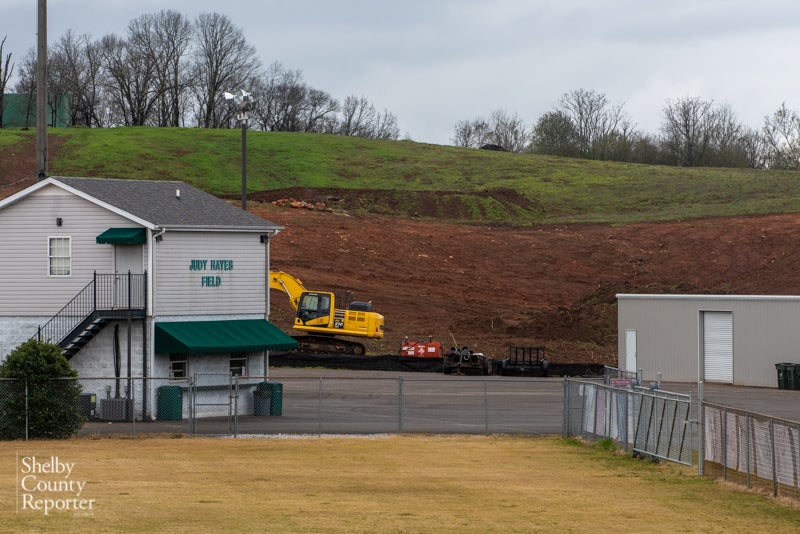City of Helena, Pelham BOE in battle for land located near Pelham High School
Published 4:47 pm Monday, April 18, 2022

- The city of Helena and the Pelham Board of Education are fighting for land that is owned by Pelham's BOE but in the city limits of Helena. (Reporter photo/Keith McCoy)
|
Getting your Trinity Audio player ready...
|
By ALEC ETHEREDGE | Managing Editor
The city of Helena and the Pelham Board of Education are in a dispute over land near Pelham High School that has led to a lawsuit filed by the city.
The 52 acres of land is situated behind Pelham High School next to the softball field and resides in Helena city limits, but is owned by the Pelham Board of Education.
According to the lawsuit filed in Shelby County, Pelham has commenced land clearing and construction activities within Helena city limits with the expressed intent of constructing one or more sports practice fields and parking lots for use in conjunction with Pelham High School, which is located in the Pelham city limits.
The property is zoned as special district—single family residential use under the Helena zoning ordinance, and according to Helena, any use other than for single family residences is prohibited.
The lawsuit, filed on Nov. 29, 2021, claims that Pelham’s clearing of the land and construction activities, and the proposed use of the property by the Pelham Board of Education, are contrary to the Helena zoning regulations and other applicable permitting ordinances and are being conducted without the necessary permits and approvals of Helena.
“The Board has indicated that they intend to continue the construction activities without seeking any permits or approvals from Helena,” read court documents.
A deed filed with the Shelby County Circuit Court shows the purchase of the land by the Pelham BOE on June 29, 2021, for the purchase price of $468,000.
In the lawsuit, Helena does acknowledge that under Alabama Case law, a board of education engaging in a governmental function is not subject to a city’s zoning ordinances.
The city, however, alleges in the lawsuit that a city board of education such as Pelham has no power or authority to construct, maintain or operate school facilities within a municipality other than its own.

The land is located on the other side of the Pelham High School softball field near the back of the school’s campus. (Reporter photo/Keith McCoy)
Helena is seeking the following upon a final hearing from the court:
- Adjudging that the Pelham Board has no power or authority to construct, maintain or operate school facilities within the Helena corporate limits.
- Enjoining the board from such use without the approval and permitting of Helena and compliance with Helena’s zoning ordinance.
- For such other, further or different equitable and declaratory relief as may be just and proper, plus costs of court.
Alabama Code 16-11-9 says, “The city board of education is hereby vested with all the powers necessary or proper for the administration and management of the free public schools within such city and adjacent territory to the city which has been annexed as a part of the school district which includes a city having a city board of education.”
“Section 16-11-9 offers no succor to Helena,” read a trial brief response from Pelham. “As pertinent, the statute invests city boards of education with all the powers necessary or proper for the administration or management of the free public schools within the city. That general grant of authority is supplemented by specific grants of authority to acquire, develop and maintain property, including property purchased to enlarge a schoolhouse lot or for playgrounds.”
The Pelham BOE’s lawyers argue that, “The only limitation placed on such authority is that the acquisition and development of the property must be for the benefit and use of the schools and/or the students they serve.”
Helena’s trial brief, however, says the Pelham BOE is diminishing the importance of the section.
“The Pelham Board attempts to diminish the importance of this section by stating that it is merely a general statement of powers and that the highlighted language does not restrict a city board’s powers to the city limits of its creator,” read court documents. “Such an argument renders the highlighted language meaningless and would leave city boards of education without boundaries, as there is no other statutory provision that expressly defines the limits of the city school district.”
Lawyers argued, in their trial brief on behalf of the city of Helena, that the legislature meant what it said in its wording as evident in Alabama Codes 16-13-193 and 16-13-199.
Alabama Code 16-13-193: Any city having a city board of education shall constitute an independent school tax district for the purpose of levying the tax authorized under this article, but it shall not be necessary for the city board of education when making application or request for a special election under the provisions of this article to submit the map or the description of boundaries.
Alabama Code 16-13-199: When a municipality under the jurisdiction of a county board of education attains a population of 5,000 or more, according to the last decennial or any subsequent federal census, the schools of the municipality may remain under control of the county board by agreement between that board and the city council of the municipality, which agreement shall be expressed in resolutions adopted by and spread upon the minutes of the two authorities. If the municipality does not enter into such an agreement, the control of the school or schools of the territory within the municipality shall be vested in a city board of education, and thereafter the district school tax collected in the city shall be paid over to the custodian of city school funds, and the district school tax collected in the contiguous territory shall be paid over to the custodian of county school funds; provided, that so much of the proceeds of the special school tax collected in the original school tax district as may be required for the retirement of outstanding warrants issued against such tax, including the interest thereon, shall be paid over to the proper official or authority to be used for such purpose.
“Helena’s reliance on Alabama Code 16-13-199’s provision relating to a newly-formed city board’s assumption of control over schools within its territory upon the city meeting the specific population threshold is unavailing,” read court documents. “The statute establishes a presumption that schools within the corporate limits of the city will come under the control of a city board of education upon reaching a population of 5,000 under the federal census. However, nothing in code 16-13-199 provides that school activities and operations must forever be restricted to real estate located within the city itself. Helena does not and cannot advance any serious argument that the proposed use of the subject property would not benefit a public school or its students. To the contrary, Helena’s position and arguments are aimed at denying Pelham’s public school students all beneficial use of the site—but with no corresponding benefit or gain to Helena’s public school students.”
Plaintiff lawyers for the city of Helena conclude that, “The Pelham Board is prohibited by statute from constructing and operating a school facility within the Helena city limits. Such an activity is not a governmental function of the Pelham Board, and therefore, the Pelham Board is not exempt from Helena’s zoning regulations. To extend the zoning exemption to the Pelham Board would violate the municipal sovereignty enjoyed by Helena and its citizens, and would be contrary to public policy.”
Defense lawyers for the Pelham BOE, however, responded saying, “Helena has struggled in vain to find defensible, legal, equitable and substantive grounds for frustrating the Pelham Board’s attempt to make productive and appropriate use of otherwise vacant and historically unusable property to serve the legitimate needs of its students. Those students have been needlessly deprived of educational and extracurricular opportunities on the basis of Helena’s misconceived effort to assert territorial interests that are not its prerogative to assert, and that, if applied here, would unconscionably lay waste to a host of sacrosanct equitable canons.”
In other court documents, there was a residential plan for the area from the city of Helena that included a neighborhood called The Preserve at Leslie’s Ridge. It is unclear when the master plan was created for the neighborhood.
Helena also asked Attorney General Steve Marshall to weigh in on the matter, but he declined due to ongoing litigation.
Currently, the two sides are waiting on a judgement in the case, which is being presided over by Judge Patrick Kennedy.
Neither side was able to find a ruling in any similar cases, which means this could set a precedence for other rulings in the future.









